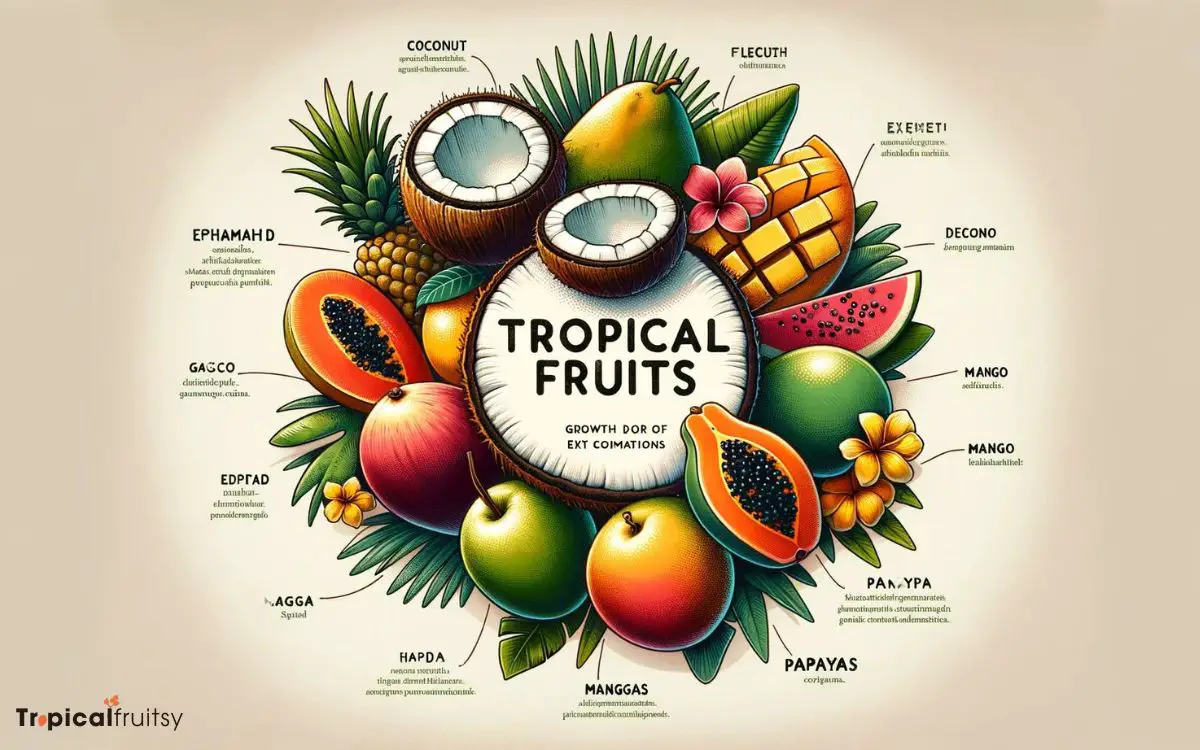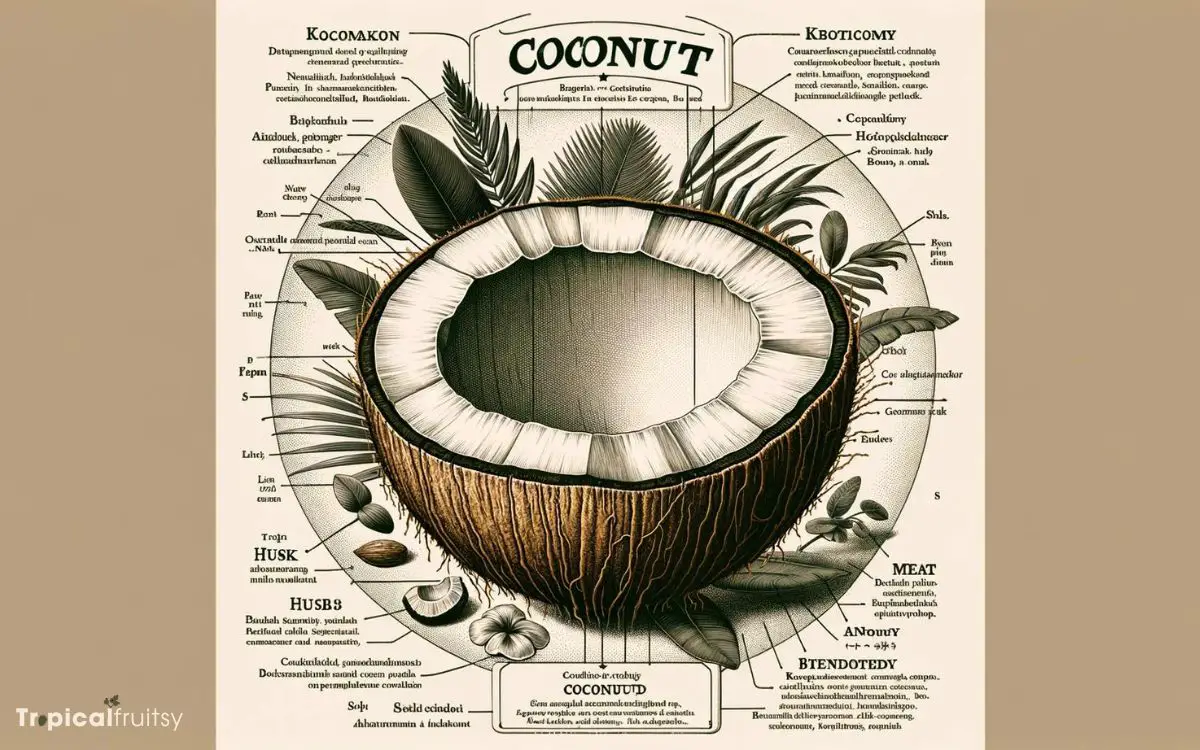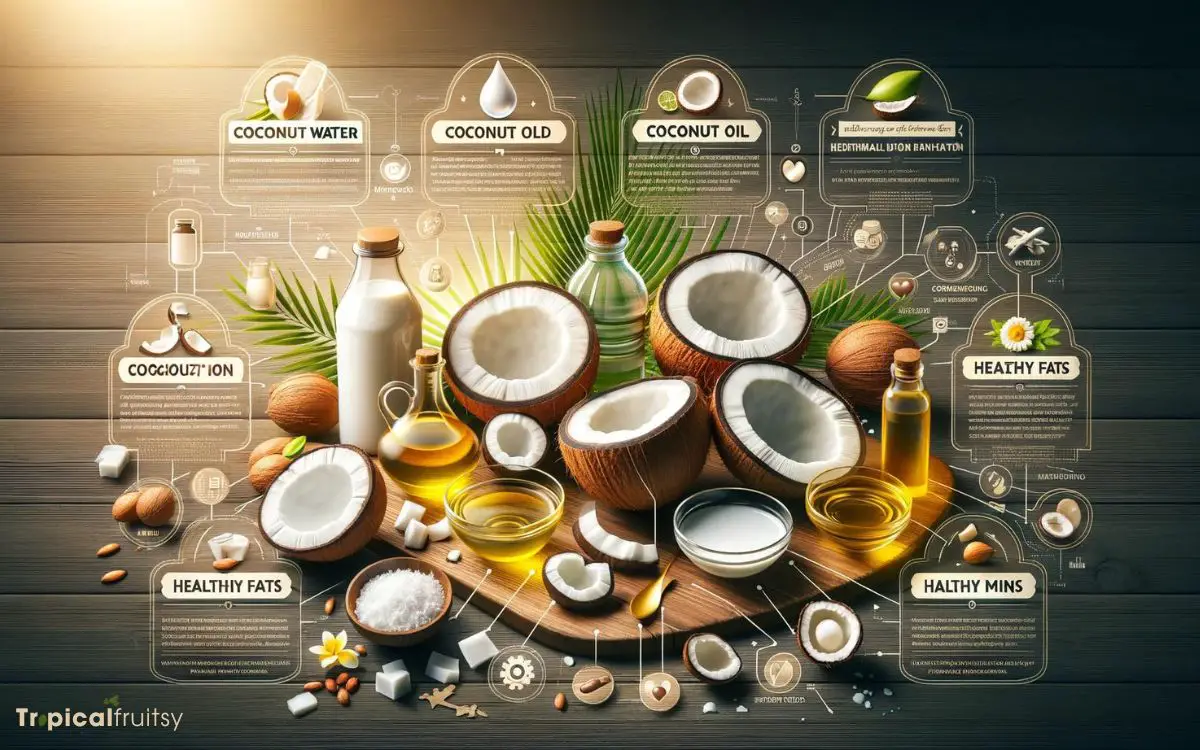Is Coconut a Tropical Fruit? Yes!
Yes, the coconut is considered a tropical fruit, specifically a type of drupe, which thrives in warm, humid climates typically found in tropical regions around the world.
Coconuts are the fruit of the Cocos nucifera palm, commonly found in tropical areas bounded by the Tropic of Cancer and the Tropic of Capricorn.
The adaptability of coconut palms to sandy soils and coastal environments contributes to their widespread cultivation in these regions.
As botanically classified drupes, coconuts consist of a hard endocarp encasing the seed, surrounded by a fibrous husk.
The unique combination of their geographical habitat and botanical characteristics solidifies their status as tropical fruits.
Coconuts epitomize tropical abundance, perfectly adapted to their sun-kissed, seaside origins.

Key Takeaway
8 Attribute: Is Coconut a Tropical Fruit
| Attribute | Description |
|---|---|
| Botanical Name | Cocos nucifera |
| Common Name | Coconut |
| Type | Drupe |
| Preferred Climate | Tropical |
| Geographical Range | Between Tropics of Cancer and Capricorn |
| Ideal Growing Conditions | Warm temperatures, high humidity, well-drained sandy soils |
| Cultural Significance | Symbol of tropical paradise, used in various cuisines |
| Nutritional Value | Rich in fiber, vitamins C, E, B1, B3, B5, B6, iron, selenium, sodium, calcium, magnesium, and phosphorous |
Understanding Tropical Fruits

Regarding tropical fruits, it is essential to recognize that they are a diverse group of fruits that thrive in the warm climates of the tropics.
These fruits typically flourish in regions situated between the Tropic of Cancer and the Tropic of Capricorn, where environmental conditions are characterized by high humidity and temperatures that seldom drop below 18°C (64°F).
Tropical fruits often exhibit vibrant colors, distinctive flavors, and a variety of textures; each species has adapted to its unique ecological niche.
Mangoes, pineapples, papayas, and coconuts are among the most well-known. Scientifically, tropical fruits are significant for their nutritional content, which includes a range of vitamins, minerals, and antioxidants.
This information sets the stage for a deeper examination of the coconut’s botanical classification.
The Coconut’s Botanical Classification

The coconut, classified botanically as Cocos nucifera, is indeed a tropical fruit and a member of the Arecaceae (palm) family.
As a drupe or stone fruit, the coconut consists of a hard endocarp that surrounds the seed. Contrary to common perception, the term ‘coconut’ refers to the entire coconut palm, the seed, or the fruit, which is not a true nut.
Botanically, the fruit is a fibrous one-seeded drupe, also known as a dry drupe. However, when considering the coconut in a culinary context, it is often categorized as a nut, a fruit, and a seed, which can lead to confusion.
The scientific classification of the coconut is based on its morphological characteristics and genetic lineage, firmly placing it within the monocotyledonous flowering plants.
Origins and Distribution of Coconuts

Coconuts originated in the region of Southeast Asia and the Indian Ocean, and we now find them widely distributed across all tropical zones around the world.
Their dispersion owes much to their unique seed dispersal mechanism; the buoyant coconuts can travel vast distances across oceans, germinating upon reaching new shores.
This natural propensity for waterborne travel has led to the coconut palm’s proliferation along tropical coastlines on a global scale.
Scientific studies utilizing genetic markers have traced distinct lineages, supporting the theory of their ancient drift from the Indo-Malay region.
As a keystone species in tropical environments, coconuts have facilitated the establishment of ecosystems where they land.
Their significance extends beyond ecology, as coconuts hold profound roles in the cultural context of many societies.
Coconuts in Cultural Context

Every tropical culture that encounters coconuts integrates them into a myriad of social, religious, and economic practices.
These cultures have developed a deep connection with the coconut palm, often referred to as the ‘tree of life,’ due to its wide range of uses from nutrition to shelter.
The coconut’s significance is deeply rooted in various cultural mores and customs, reflecting its versatility and importance.
- Symbolism: In certain cultures, coconuts symbolize life and fertility, featuring prominently in rituals and ceremonies, such as weddings and religious offerings.
- Economic Value: Coconuts contribute significantly to local economies through the production of copra, coconut oil, and other derived products, providing livelihoods for millions.
- Culinary Importance: The versatility of coconuts is celebrated in traditional cuisines, where every part of the fruit is utilized, from the water to the flesh, and even the husk and shell.
Are There Any Other Fruits That Are Considered Tropical?
Mango, coconut, and papaya are also considered tropical fruits, in addition to pineapple. These fruits thrive in warm, humid climates, making them popular in tropical regions. Their unique flavors and health benefits make them a staple in tropical cuisine.
Health Benefits of Coconuts

While often enjoyed for their refreshing taste, coconuts also offer a plethora of health benefits, ranging from hydrating properties to a rich content of vitamins and minerals.
The water within coconuts serves as a natural electrolyte-rich drink, facilitating hydration and replenishment of minerals lost through physical activity.
Coconuts provide a substantial amount of medium-chain triglycerides (MCTs), which are metabolized differently than other fats, potentially aiding in weight management and energy expenditure.
The flesh of the coconut is also a valuable source of dietary fiber, which promotes digestive health.
Moreover, coconuts contain lauric acid, which can support the immune system due to its antimicrobial properties.
Analyzing these attributes reveals that coconuts are not only a delectable tropical treat but also a nutritious addition to a balanced diet.
Conclusion
The coconut decidedly earns its status as a tropical fruit through its botanical classification, prolific growth in warm climates, and its integral role in various cultural tapestries.
Rich in nutrients, it contributes valuable health benefits, reinforcing its importance in a diverse diet.
Amidst the pantheon of tropical fruits, the coconut stands as a veritable ‘Crown Jewel,’ offering sustenance, cultural significance, and a touch of exoticism to the culinary and nutritional realms.






